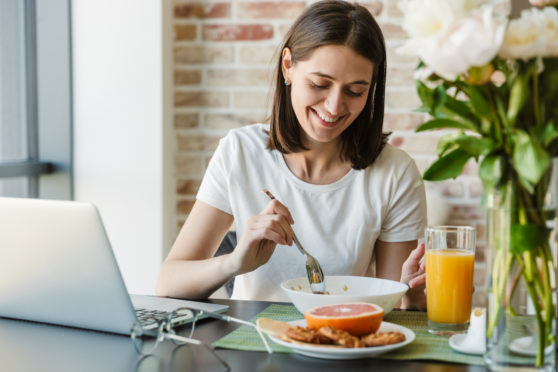
Being stuck at home in lockdown has had many of us reaching for the cupboard in search of those feelgood comfort foods, like chocolate and cake.
But experts say, there has never been a more important time to think about healthy eating and lifestyle.
Naveed Sattar, professor of metabolic medicine at Glasgow University, has been researching links between obesity and Covid-19. And his findings show the more excess fat patients have, the more severe their outcome is likely to be if they contract coronavirus.
“One of the things research shows is a link between excess fat and having a more severe outcome of this infection,” he said. “Initial research suggested this was more likely for patients who were very heavy, with a BMI of say 35 to 40, so people who were severely obese.
“Some of our research suggests people who are overweight and contract the virus are also more likely to end up in hospital than those with normal weights. For people who are obese, the chances are higher and extreme obese, higher still.
“You are more likely to go into ICU if you carry excess fat. There is a linear link between excess fat and the severity of the outcome of Covid-19.”
Professor Sattar says the link may be stronger in the under 60s. He said: “As you get older, your weight can fall for a number of reasons, so links between obesity and Covid may be less apparent.”
And his research points to similar links with diabetes.
“There are papers from Italy, China, the USA, the UK and others all saying the same thing,” professor Sattar said.
“There have previously been links to obesity with flu and other illnesses – but, worryingly, links to C-19 appear stronger.
“With coronavirus, some people take a severe immune hit. If you’re obese, you already can’t pump as much oxygen into your lungs. Your heart function is also often less efficient, further impairing delivery of oxygen to your tissue. You also have more tissue to deliver oxygen to. The ability of your lungs and cardiovascular system to work together to extract oxygen and deliver it to your tissue is negatively impacted.”
Further, professor Sattar says many doctors have noted that Covid-19 makes your blood thicker. Blood thickness is often already higher with obesity, a well-known risk factor for thrombosis – this is compounded when Covid-19 ensues. As oxygen is carried around your body via blood, the upshot can be less of this vital element is taken to your kidneys, liver and lungs, which can lead to organ failure.”
It’s a frightening thought the professor says, but one that seems to be encouraging positive behaviours.
“I think people are taking note,” he said. “They are scared. Some people have already sprung into action, trying to incorporate fitness and healthier eating into their lifestyles, but others don’t know where to start. This needs to be tackled, but it isn’t about fat shaming.
“My job is to look at whether we can motivate our NHS to provide better guidance to people in how to lose weight by taking small steps. We need to provide better signposts, which we haven’t in the past. We need to up our agenda in tackling obesity and helping people.
“Simple advice may be effective currently – and may result in more people willing to try. For example, giving up sugary drinks and reverting to water or diet drinks instead. And choosing fruit instead of confectionery.
“Over time, we can retrain our palettes to appreciate a drink of water as much as a sugar-filled drink and an apple over a bar of chocolate. In lockdown, it’s especially hard to be healthy. We’re stuck at home in close vicinity to the kitchen, and normal routine has gone by the wayside.
“But this is an important time to look at our habits and try to develop little changes that can help. By all means have a biscuit with your tea, but choose a healthier option and take your time with it.
“We should never be giving people a hard time about weight, instead trying to encourage them to embrace healthier habits and give some little changes a try. And it’s okay if something doesn’t work for you. Embracing failure is how we find those little things that do work.”
Fiona’s story: ‘Lockdown has been fantastic. I’ve never been so healthy’
When gyms closed down at the beginning of lockdown, Fiona Miller thought she was doomed.
After years battling with her weight, the 39-year-old, from Paisley, was on the road to reaching her goal weight. But then everything was thrown into chaos. “At my heaviest I was over 22 stone,” Fiona explained. “I was miserable.”
After years of losing weight then letting it creep back on, Fiona signed up to Weight Watchers last summer and promised to shed those extra stones. “This time I knew I needed to up my game with activity as well as diet so I joined a gym and started going to classes,” she said.
“Then lockdown happened. The first couple of weeks were challenging, as I couldn’t get into a new routine. I also separated from my husband, which was tough. But I decided to use lockdown to my advantage.
“I did home workouts, virtual workouts, walking outside with my son five times a week to ensure we were being healthy together.
“Most importantly, I told myself to be positive where I can be while allowing myself down days. I don’t use them as triggers to go back into old habits. Instead I create new habits and look at how I can breakdown those barriers.”
Fiona has ditched her diet of chippies, pies, pasties, and chocolate in favour of chicken, eggs, veg and salads – and says she’s eating more than ever, but it’s the right foods.
The IT retail solutions specialist has lost two-and-a-half stone during lockdown and is now a much happier 15 stone 7lbs. She has dropped five dress sizes in the last year and is down to a size 18.
“I’ve still got another five stone to lose, but I already feel fantastic,” Fiona said. “It turns out lockdown has been one of the best things that could happen for me. At a time people are worrying about their health, I feel the healthiest I have ever been.
“I’m starting to worry by the end of it people won’t recognise me – but that is a good thing!”

Enjoy the convenience of having The Sunday Post delivered as a digital ePaper straight to your smartphone, tablet or computer.
Subscribe for only £5.49 a month and enjoy all the benefits of the printed paper as a digital replica.
Subscribe
